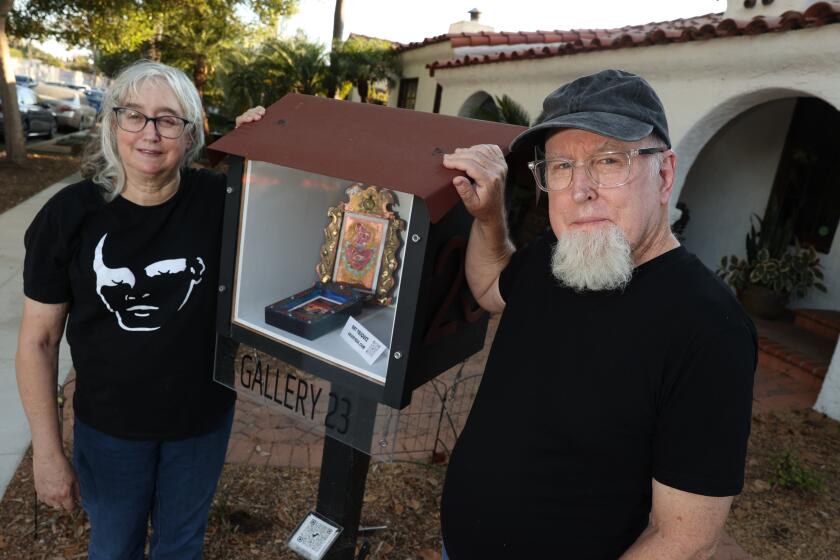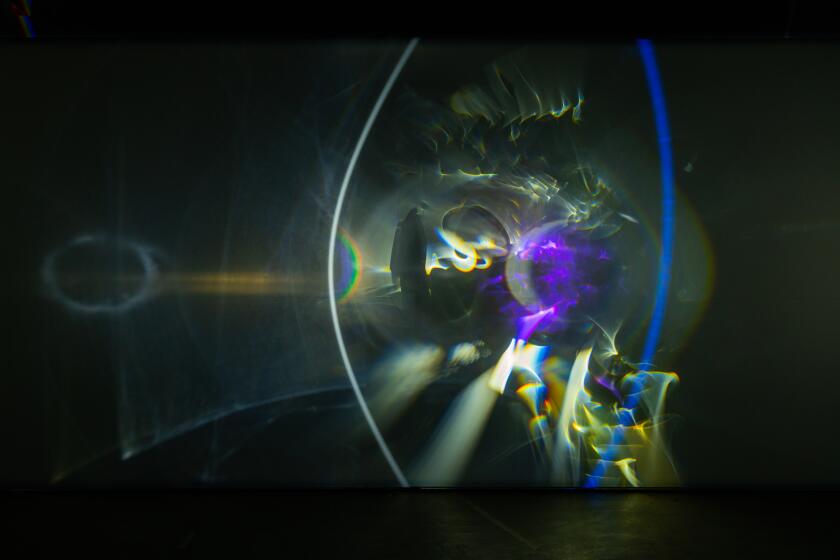Always Leave ‘Em Thinking
I had never interviewed an Avowed Lesbian before, so when I first met Monica Palacios I didn’t know whether to shake her hand, kiss her on the cheek or challenge her to arm-wrestle.
A simple handshake didn’t seem, well, grand enough to acknowledge the moment of convergence between two people from different sexual persuasions. It was like the day E.T. met little Elliott.
On the other hand, a kiss on the cheek would have said, “Hey, I know you’re a lesbian, but that’s OK, it’s probably not your fault,” and that wasn’t right either.
Equally stereotypical would have been a physical challenge of any kind. In addition to its distasteful connotation, such a challenge would also embody a potential for humiliation. I mean, suppose she won?
As it was, we shook hands, and I remember her saying, with just the slightest smile, “firm handshake,” which was an indication that she somehow perceived what was buzzing through the hollows of my mind.
I already knew she was lesbian due to a flyer advertising her show as a “Latin Lezbo Comic” March 1 and 2 at a Santa Monica performance arts center called Highways.
A stand-up comic and storyteller, Palacios is Mexican-hyphen-American, which is where much of her humor is also rooted.
She puts it this way: “I was born of Mexican-American persuasion, then I became a Chicana, then a Latina, then a Hispanic, then a Third World member, then a woman of color. Now I’m just an Amway dealer and life is great.”
The flyer attracted me because it seemed a kind of reaching out across a chasm of ignorance, and I wanted to know who the reacher was.
Palacios is 31, dark-eyed, and, like most comics, has the furtive manner of a forest creature about to be pounced upon.
Also, she is, by any measure, a very funny person.
Born in San Jose to a loving family (“Dad never hit us. We had to beg, ‘Hit me, please, hit me!’ ”), she discovered humor and her sexual preference about the same time.
They’ve been together ever since.
“I remember telling my mom about it,” she says. “I go, ‘You know, mom, I’m a lesbian.’ She goes, ‘Well, as long as you’re happy. Just don’t tell your father.’ ”
She began doing open-mike stand-up acts at age 23 in gay and lesbian clubs in San Francisco, but worried it might stigmatize her.
“I didn’t want to do just lesbian stuff,” she says. “I am a Mexican-American vegetarian lesbian writer / performer and I wanted society to be aware we all exist, we all have human stories to tell. . . .”
Palacios realizes, however, that talking about being a lesbian builds the kinds of bridges only humor can build, the way blacks used laughter in the ‘60s to arc old hatreds.
So she tells her audiences, “I have a sister who is lesbian, too. People go, ‘Did you guys eat the same thing or what?’ ”
And she tells them: “I love my family and they love me. I’m a lesbian but we don’t talk about it. Why ruin a good meal?”
Palacios has lived in L. A. three years, and it’s a new kind of humor she brings to a city that has almost, but not quite, seen it all.
The “Latin Lezbo” approach is an effort to reach a segment of audience that has been almost out of reach.
She isn’t crazy about the term lezbo, but she isn’t that keen about lesbian either. She is thinking of calling herself a lebby.
But at least, she says, “Latin Lezbo” is informative and to the point. “People know right off they’re not coming to see ‘Bambi & Friends.’ ”
“Humor saps our resistance and opens us to new ideas and experiences, whether we want them or not,” Roland Palencia says. “Humor is the art form of surprise.”
He’s co-founder of Viva!, a gay and lesbian Latino art organization that is co-producing the show.
“In her work, Monica expresses her individuality as a Mexican and as a lesbian. Every house has many windows. Depending upon which window an audience is taken will determine what they see.”
Palacios hopes that by being both and talking about it, she’ll even lessen the animosity Latinos feel toward lesbians.
“The groups will figure out they are very similar,” she says, adding, “Well, almost. Latinos cook better.”
Meanwhile, she tells her audience: “I took my wife--the missus, the little woman--to meet my family. I said, ‘This is my wife.’ Everyone got real silent, then my mom said, ‘C’mon, everybody, let’s eat!’ ”
She smiles, remembering, but the smile fades.
“Things are changing,” she says, “but there’s still a lot of gay-bashing going on. It’s hard sometimes. It’s very hard.”
The comment wasn’t intended to leave me laughing. But it sure left me thinking.
More to Read
The biggest entertainment stories
Get our big stories about Hollywood, film, television, music, arts, culture and more right in your inbox as soon as they publish.
You may occasionally receive promotional content from the Los Angeles Times.










